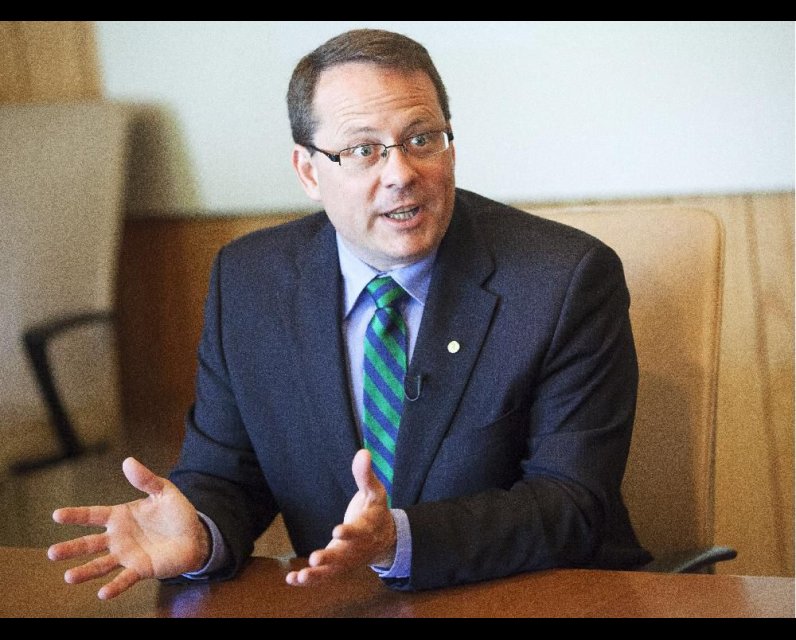Unpublished Opinions
Stefan Klietsch grew up in the Ottawa Valley outside the town of Renfrew. He later studied Political Science at the University of Ottawa, with a Minor in Religious Studies. He ran as a candidate for Member of Parliament for Renfrew-Nipissing-Pembroke three times from 2015 to 2021. He recently graduated with a Master of Arts in Political Science at the University of Carleton.
Why the Green Party of Ontario will not gain ground in the 2022 provincial election

Photo from the Ottawa Citizen.
The ongoing pandemic has been a test run of the capacity of government to address further potential or inevitable crises of the future, from climate change to pandemics of even more malignant viruses. With the growing dangers of climate change ever apparent and with the failure of Premier Doug Ford's government to be consistently responsive to scientific evidence, such as stalling for months on vaccine mandates for non-essential public gatherings before eventually caving, the opportunities for opposition parties to grow should be abundant. With the Green Party of Ontario (GPO) newly eligible for inclusion in the leadership debates of the coming election, that party should logically be most poised to gain ground in the 2022 Ontario election.
Yet I predict that the Green Party will not make significant progress in this year's provincial election. GPO Leader Mike Schreiner will be re-elected as Guelph's MPP, and repeat candidates for the party will grow vote shares where the party is strong in Dufferin-Caledon and Parry-Sound Muskoka. Yet no new Green MPPs will be elected, and that will largely though not entirely be the fault of the incumbent Leader Mike Schreiner.
The influences of leadership debates and even political campaigns upon election outcomes are real but exaggerated. An even greater influence upon the success or failure of political parties is the work that parties engage in between elections, and the internal atmosphere that parties maintain towards dedicated supporters. Political parties that are internally accountable and widely representative of Ontario will gain ground, while political parties that are accountable only to a few or only to the Leader will not gain ground.
When I began my involvement in the Ontario Greens in 2012, many senior Greens were still involved in the party whose time there predated Mike Schreiner's leadership, even if former leader Frank De Jong was no longer involved. Today, few of those senior Greens would remain, as the Leader has failed to adequately sustain consistently growing profiles of other figures within the GPO.
How the Green Party of Ontario functions as a dictatorship
The Green Party of Ontario is not a dictatorship in the sense of an organization where the figurehead directs orders and his will is obeyed; rather the GPO is a dictatorship where the Leader always gets his way without even needing to ask for his will to be obeyed. Perversely, the Executive Director is not accountable to the party's elected Provincial Executive, but rather the Executive Director is accountable to the Leader, and the Provincial Executive is accountable to the Executive Director.
Evidence of this power hierarchy is the pattern of promotion that exists within the party: the current GPO Executive Director was picked among dozens of competing candidates despite a lack of managerial experience, but of course as expected in line with her past history working as an assistant for the Leader's Office. Mike Schreiner's Chief of Staff at Queen's Park from 2018 to 2020 was not only the prior GPO Executive Director, but for the summer months of 2018 his newly-hired Chief of Staff was still simultaneously working as the Executive Director - stepping down only after supervising the selection process for her successor.
In addition to this pattern of promotion, the recommendations of the Executive Director seem to be rubber-stamped by the Provincial Executive in a non-independent manner. Seemingly the Director's recommendations for Executive vacancy appointments, for election candidate rejections or approvals, and for membership expulsions are never rejected. Furthermore, most GPO members voting in party elections for the Provincial Executive have little information about the conduct of their Provincial Executive, and therefore would not be able to judge or vote against this apparent lack of independence.
The rules of the party's internal game for members are therefore simple: behave in line with the direction set by the Executive Director, and you may have a chance at growing your party profile. Defy the direction set by the Executive Director, and you may be expelled from the party instead. For the Executive Director, the rules are equally simple: serve the Leader's interests, and you will be rewarded accordingly. The Leader in turn does not closely monitor the internal operations of the party, but he takes note of the overall performance of the Executive Director in serving his interests and ensuring that he gets his way.
The Green Party of Ontario's policy and governance processes never meaningfully challenge or humble the Leader Mike Schreiner with any correction to his publicly-stated policy preferences. Of course, any legitimate leader will tend to be closely aligned with their party's membership's general preferences, but no Leader is 100% correct all of the time in every dispute with every party member, even if the GPO pretends otherwise.
How a party with Participatory Democracy as a founding value evolved into such a centralized top-down institution likely depends upon historical developments that predate my involvement in the party. But suffice to say, the Green Party of Ontario unlike the Progressive Conservatives, Ontario New Democrats, and Ontario Liberals has minimal history of competitive leadership races. Despite existing since the 1980s, the GPO has only ever had two Leaders, and therefore minimal history to demonstrate fulsome competitiveness for the Leader's Office, nevermind the limited competition for the other roles of the Provincial Executive.
How the GPO's leadership style causes policy stagnation
The GPO's anti-democratic governance style inevitably squashes new ideas that could gain the party public attention or growth. I would know, because for years I proposed many new policy and governance ideas to the GPO and I was subject to the frustrations of all the party's hidden rules as described above.
Some of my policy motions were in fact voted and approved by the party, but anytime I persisted in recurring policy or governance disagreements with party leadership, those close to the Leader became increasingly tense towards me even as my overall number of friends in the party had increased. The only ideas of mine that the party would accept were the ones least consequential and novel in the grand scheme of things. (With one exception: the party did adopt my policy proposal for fully-public-funded postsecondary tuition. The credibility and believability of this new policy is however undermined by the lack of a credible plan of how to pay for this policy, as the party did not also adopt my idea for a higher HST rate policy.)
The GPO will continue to advocate for novel policy ideas that none of the other parties do, such as abolishing the public Roman Catholic school boards. However, it is noteworthy that this was a novel policy idea that the party first adopted under a previous party leader. The point being, Mike Schreiner's GPO is usually fine with advocating for big ideas as long as the big ideas were introduced under previous leadership or by himself first. But few or no newer big ideas will be fostered within the GPO under its current leadership.
Already the previous Ontario Liberal government implemented the GPO's signature proposal of banning political donations by corporations and unions. If other political parties adopt more of the GPO's remaining signature policies, prospective voters will see little distinction between the GPO and other like-minded parties, and simply vote for the stronger and more viable party or not vote at all. Thus the GPO would not benefit from having lessened distinction from the other parties.
Concluding thoughts on the future of the Green Party of Ontario
In the years since 2018 when the Green Party of Ontario elected its first ever MPP, the GPO has seemingly been sitting on the sidelines of media attention and without rising in the polls beyond single-digit support. Meanwhile, the Liberal Party of Ontario after suffering its worst-ever election result in 2018 has since stayed in the media spotlight. It has risen in the polls to become competitive with the Progressive Conservatives, even as the Liberal Leader has largely run party operations out of his dining room.
Perhaps these is some amount of pro-establishment bias in Ontario's media and politics that privileges Liberals with unjustified attention and punishes the Greens with undeserved lack of attention. But perhaps the Liberals are getting much more attention than the Greens because the Liberal Party simply has much more new in the way of ideas to grab public attention with. The Liberals do not run regular policy conventions like the Greens, yet as recently as last October they announced a newfound support for ranked ballot reform, whether that policy is wise or not. Who can remember the last time that the Green Party announced a major new policy that it did not already support consistently prior to 2018?
The GPO leadership has banked its would-be success on hopes that more Ontarians will learn about the Green Party who did not know about it before and then appreciate the party accordingly. Yet the Green Party of Canada has gained significant public attention in recent years and suffered electorally all the same. There is little reason to believe that the GPO will make progress in 2022 by running on fundamentally the same ideas that it did in 2018.
Mike Schreiner enjoyed overwhelming support in the GPO's last leadership review, but very few voting members understand how he runs the party. I myself did not understand until after six full years of active involvement, until after I had attempted to run as a candidate for Deputy Leader. The truth is that while Mike Schreiner only ever exudes positive vibes and energy in public forums and in his work as a legislator for Guelph, the GPO maintains too tense of an atmosphere on his behalf towards any persistent dissent from party members.
The Green Party of Ontario will not grow significantly in the coming election, and the disappointing electoral outcome will be largely the fault of the Leader Mike Schreiner and those close to him.
Stefan Klietsch
Renfrew/Ottawa



Comments
Be the first to comment